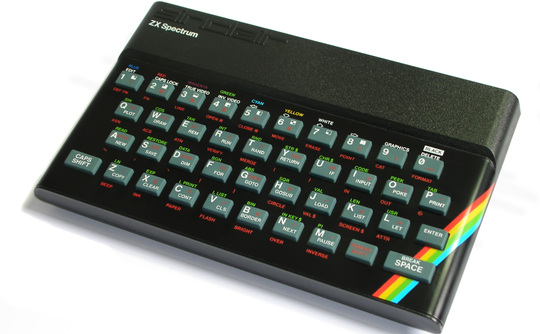

Original ZX Spectrum
The ZX Spectrum was an iconic home computer that first emerged in 1982 and was manufactured in Dundee, Scotland by Sinclair Research Ltd.
The ZX Spectrum was immensely popular (sorry Commodore 64 fans) in the UK and Europe, and instantly stood out thanks to its rubber keyboard, its use of peripheral (i.e a joystick interface, microdrive and even a printer), and cassette tape recorders to load programs and games.
Such is the fondness for this device that a third party firm, Retro Computers Ltd (backed by Sir Clive Sinclair), is attempting to bring out a new device called the Spectrum ZX Vega+ (although with varying degrees of success).
It is fair to say that in its time, the 8-bit ZX Spectrum became a symbol of British technological progress and inspired a generation of young people to learn programming.
It also introduced home computing to the masses.
Indeed, the computer’s importance was recognised in 1986 when the company’s founder Sir Clive received a knighthood for “services to British industry”.
During its lifetime, ZX Spectrum sold in excess of 5 million units, but it was actually the third computer to be produced by Sinclair Research. The first was the ZX80, and the second was the ZX81.
Initially, two models were released – one with 16kb of RAM and one with 48kb of RAM, priced at £125 and £175 respectively.
The ZX Spectrum (or Speccy as it was fondly known), was advertised as “less than half the price of its nearest competitor – and more powerful”.
And Speccy was one of the first home computers to deliver colour graphics and was capable of 256 x 192 pixel resolution when it was plugged into a television.
It also used audio cassette tapes for loading and saving programs and data, which was both a blessing and a curse, as the loading process could be highly temperamental and users often had to carefully adjust the volume to get a program or game to load properly.
And speaking of games, the ZX Spectrum assembled a vast library of 23,000 software titles, including hugely popular games such as Elite, Manic Miner, Jet Set Willy, The Hobbit, Daley Thompson’s Decathlon, and this writer’s personal favourite, The Way Of Exploding Fist’ (which actually ported from the Commodore 64).
Other models of the ZX Spectrum followed soon afterwards including the ZX Spectrum+ (1984); the ZX Spectrum 128; and the ZX Spectrum +2 (produced by Amstrad, after it acquired the Spectrum range and the entire Sinclair brand in 1986 for just £5 million).
Indeed, versions of the ZX Spectrum continued to appear until the computer was officially discontinued in 1992.
And unfortunately the ZX Spectrum has been in the news of late for all the wrong reasons.
A company called Retro Computers Ltd is behind a new crowdfunded retro games console, the Vega+, which looks somewhat similar to Sony’s PSP handheld gaming console.
Matters are no being helped by the fact that seems to be a business dispute with two former directors.
And now the crowdfunding platform Indiegogo has, according to the BBC, intervened to stop the Vega+ from acquiring further funding.
Quiz: Do you know the jobs taken by famous tech personalities?
New chapter for famous name from Internet's early days, Napster, has been acquired and will…
Solving not-spots? Ofcom proposal to make UK the first European country to allow ordinary smartphones…
Pioneering robotaxi service from Alphabet's Waymo to go live in Washington DC next year, as…
Dozens of Chinese firms added to US export blacklist, in order to hamper Beijing's AI…
Chinese rival BYD overtakes global revenues of Elon Musk's Tesla, as record number of Tesla…
Messaging app Signal in the headlines after a journalist was invited to a top secret…